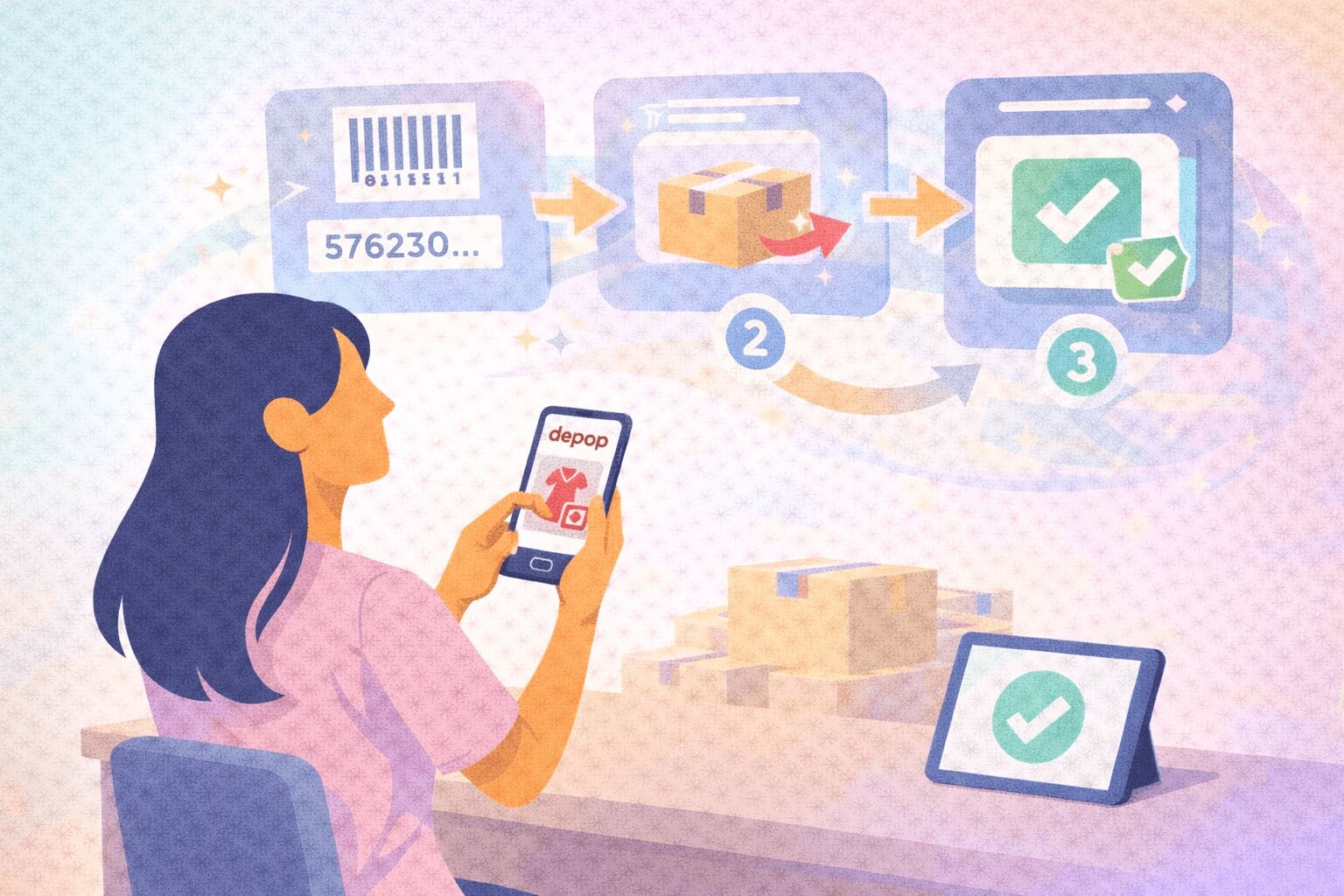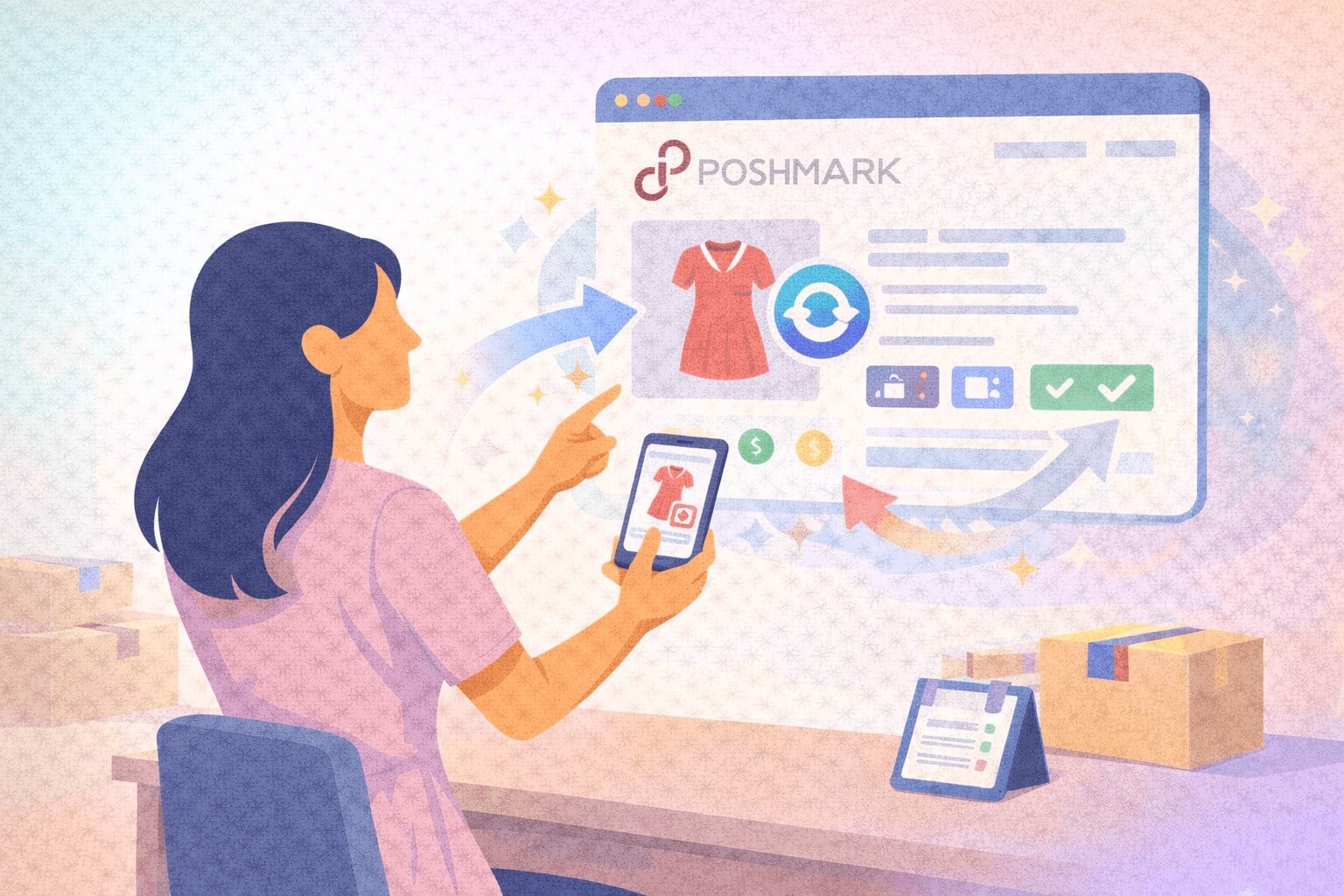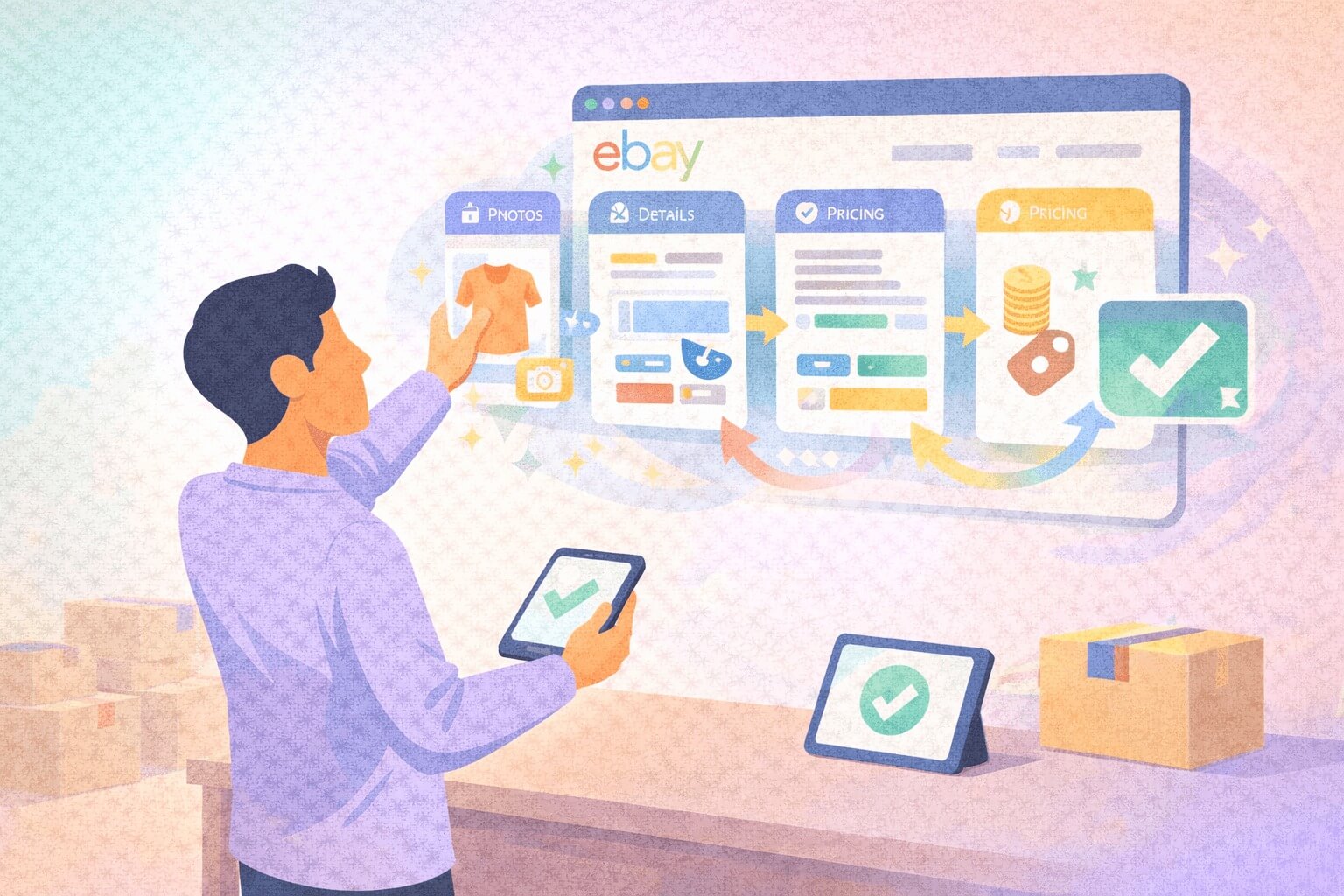Where do resellers get their products? 2026 guide

Resellers get their products from thrift stores, garage sales, estate sales, online marketplaces, and wholesale suppliers.
For example, successful resellers pay $5 to $15 at thrift stores for vintage items that sell for $50 to $200 on platforms like Poshmark and Depop. Some estate sale items cost $10 to $50 and still resell for several hundred dollars online.
Learn about sourcing inventory, strategies to avoid scams, and how to choose the best platform to sell. We’ll also discuss Nifty, a tool that lets you crosslist across platforms automatically, no copy-pasting required.
Where to buy items to resell: At a glance
Sellers buy items to resell from thrift stores and local resale shops, online marketplaces, and wholesale suppliers. Explore these sources to learn where to buy items to resell:
Thrift stores
Thrift stores and local resale shops provide resellers with affordable access to vintage fashion, designer accessories, shoes, and handmade items. Thrift stores stock items like Y2K jeans, old Levi's, and handcrafted jewelry.
Shoe resellers often find vintage pairs at thrift shops or source brand-name styles from Nike outlets and department stores.
Experienced resellers target overlooked thrift store finds priced at $5–$15, then flip them for $50–$200 on platforms like Poshmark and Depop. Sourcing overlooked items from thrift stores generates high profit margins on platforms like Poshmark and Depop.
Product examples
Popular thrifted categories include Y2K jeans, Doc Martens, old Levi's, and handmade jewelry. These items sell well on Depop and Poshmark due to their trend appeal.
Sneaker resellers can profit by finding vintage footwear at thrift prices. They resell these shoes online for five to ten times the cost to collectors and fashion buyers looking for authentic vintage styles.
Works best with
Clothing from thrift stores sells best on Poshmark, Depop, Mercari, and eBay. Buyers on Poshmark, Depop, Mercari, and eBay actively search for secondhand and vintage fashion.
Limitations
Thrift store sourcing takes time and often requires travel to thrift shops in other towns or cities to find profitable items.
Garage and estate sales
Many luxury resellers get their products from estate sale, which often list designer goods far below retail. Resellers use garage and estate sales to find designer items and collectibles for cheap.
Home or estate owners usually offer deeply discounted prices on these items to clear out space.
Garage and estate sales generate exceptional profit margins because sellers often price items far below market value. For example, resellers often buy $10–$50 luxury items at estate sales and flip them for hundreds online. One reseller made profits of anywhere from around $7 to over $82 on estate sale goods.
Another reseller found cheap items at garage sales, averaging profit margins of over 100%.
Product examples
Luxury consignment sellers and vintage collectors often turn to garage and estate sales for low-cost designer pieces. These venues help resellers find high-end fashion, jewelry, and collectibles that sell for premium prices online.
Works best with
Resellers who focus on garage and estate sales often see strong results on eBay and Poshmark.
Limitations
Weekend-only availability and seasonal restrictions make garage and estate sales unreliable for consistent inventory sourcing. Most garage and estate sales happen on Saturday and Sunday mornings, limiting sourcing opportunities for sellers who need weekday inventory.
Online marketplaces
Online arbitrage helps beginners start a reselling business because they can purchase discounted or clearance items. Resellers buy clearance items from Target, Walmart, and Amazon to flip through online marketplaces.
Arbitrage sellers build a steady income by flipping discounted brand-name goods. Resellers consistently profit by flipping discounted brand-name items at market prices.
Product examples
Resellers often use online arbitrage to flip shoes, electronics, collectibles, and luxury items with stable demand. These items are always in demand and have predictable resale value.
Works best with
eBay, Mercari, and Poshmark provide ideal platforms for online arbitrage. These marketplaces allow sellers to list items at market prices and reach buyers looking for deals. Sellers also get protection and authentication services that help them move arbitrage inventory quickly.
Limitations
Competition from other resellers and authentication requirements create challenges, especially in popular categories like sneakers and luxury goods. Some categories come with strict rules, and sellers risk suspension if they don’t follow them.
Wholesale suppliers
Resellers turn to wholesale suppliers for bulk inventory and discounted rates. These suppliers include clothing manufacturers, electronics distributors, and authorized brand dealers who sell products in quantity minimums.
Wholesale reselling businesses buy products below retail prices with verified authenticity and consistent stock levels and flip the items, aiming to make a 30–40% profit margin.
Product examples
Wholesale suppliers work best for beauty, home goods, electronics, and unbranded accessories. Resellers flip skincare bundles, coffee makers, tumblers, and organizers from wholesale suppliers. Buyers regularly purchase these items, which don’t need brand authentication.
Works best with
Resellers use eBay, Mercari, and Poshmark to list arbitrage items for quick flips. These platforms also offer tools that help resellers manage bulk wholesale purchases and reach buyers.
Limitations
High upfront investment requirements can demand several $1,000 minimum orders, creating cash flow challenges that can overwhelm beginners.
Liquidation and closeouts
Liquidation and closeout strategies involve sourcing surplus inventory from retailers, manufacturers, and overstock sellers. Liquidation resellers often earn strong margins by buying inventory at 10–30% of retail value.
Liquidation platforms sell mixed-product pallets by weight or lot size. This allows resellers to buy hundreds of items in bulk without inspecting or selecting each one. Source from B-Stock, BULQ, and Via Trading, as these platforms offer legitimate products.
Product examples
Liquidation works best for apparel, returned electronics, and home accessories. These categories offer diverse inventory options that appeal to broad buyer demographics across multiple selling platforms.
Works best with
eBay, Mercari, and Facebook Marketplace provide ideal platforms for liquidation inventory reselling. These marketplaces support individual item listings and attract buyers seeking discounted brand-name merchandise from various categories.
Limitations
Liquidation limitations include scams from fraudulent suppliers, storage requirements, and unknown inventory contents that may include damaged or unsellable merchandise.
You’ll need to vet suppliers and secure storage space to make liquidation work. Beginners often struggle with liquidation because it requires upfront capital and considerable research.
Retail arbitrage and outlet clearance
Retail arbitrage and outlet clearance involve purchasing discounted merchandise from physical retail stores, outlet malls, and clearance sections. For instance, resellers source from Target clearance racks, Nike outlets, and end-of-season sales at department stores.
Beginners often start with retail arbitrage because it offers quick access to inventory and a low upfront cost. This approach generates consistent profit margins because resellers purchase discounted authentic brand-name merchandise and resell at market rates.
Product examples
Retail arbitrage works best for fashion, footwear, accessories, and beauty. Resellers flip apparel, returned electronics, and home accessories across platforms due to broad buyer demand.
Product examples like Nordstrom Rack shoes, Target clearance apparel, and TJX beauty kits provide authentic brand-name merchandise at discounts to support profitable margins.
Works best with
Poshmark, Mercari, and Amazon attract buyers seeking brand-name merchandise at competitive prices with fast shipping options. These platforms help resellers list products quickly and adjust prices to stay competitive.
Limitations
Time-intensive store visits make retail arbitrage physically exhausting. Resellers need to visit several stores daily to find enough inventory to stay profitable.
Top 5 tips for buying your first wholesale inventory
Tips for buying your first wholesale inventory are researching verified suppliers, calculating profit margins, and starting with small minimum orders. These tactics reduce financial risks and help beginners understand how wholesale relationships work:
- Do your homework: Verify each supplier's business license, ask for references, and read reseller reviews before making wholesale commitments.
- Calculate your estimated profit margins before purchasing: Add up product price, shipping, marketplace fees, and storage to get a clear picture of your margins before placing an order.
- Watch for red flags when evaluating suppliers: Red flags include suppliers demanding full payment upfront, offering prices that seem too low compared to other suppliers.
- Beginners should start small: Order the minimum quantity first to test supplier reliability and customer demand. Small initial orders allow new resellers to evaluate product quality, shipping times, and customer response without risking major upfront costs.
- Use tools for tracking the cost of goods over time: Track the cost of goods over time using tools like Nifty to see which products drive the most profit. Nifty’s analytics help resellers decide which suppliers actually earn repeat business based on profit.
How to watch out for fakes, scams, and traps
Avoid scams by learning how to spot counterfeits, fake suppliers, and deceptive pricing. Use these tips to protect your business:
- Learn product authentication techniques: Learn how to authenticate luxury items, especially designer sneakers and handbags. Check serial or date codes against manufacturer records (e.g., match sneaker SKUs to in-shoe numbers and verify Louis Vuitton date‐code formats). Examine stitching quality; genuine luxury items have uniform, tight stitches and perfectly aligned patterns, whereas counterfeits often show loose threads or uneven spacing.
- Spot pricing schemes targeting new resellers: Avoid “too good to be true” deals that promise designer goods or popular sneakers at impossibly low wholesale prices from unknown sources.
- Stick with verified wholesale suppliers who have proven track records: Focus sourcing efforts on legitimate wholesale suppliers with proper business licenses, established track records, and verified customer references rather than chasing risky opportunities.
Once you source, where should you sell?
Sell luxury clothing and accessories on Poshmark, electronics on eBay, and vintage items on Depop. Pick the reselling website that matches what you're selling:
Poshmark
Fashion buyers use Poshmark to find luxury brands and everyday activewear at discount prices. This platform works best for brand-name inventory like Louis Vuitton, Gucci, Lululemon, Nike, Coach handbags, and other designer brands.
The platform offers tools like livestreams and listing shares, including hosted livestreams called Posh Parties. You can share your listings and others’ on Poshmark to increase views.
eBay
eBay supports inventory categories like electronics, collectibles, and automotive parts. It also offers mixed merchandise that draws in a wide range of eBay buyers looking for specific deals.
eBay works well for online arbitrage sellers flipping inventory to global buyers. eBay’s Seller Hub helps manage bulk listings and use paid promos.
Depop
Depop attracts Gen Z and younger millennial buyers seeking vintage fashion, aesthetic pieces, Y2K trends, and handmade items that showcase personal style or DIY fashion. This platform favors unique inventory like vintage band tees, retro sneakers, and handcrafted jewelry, as long as they're photographed well.
Depop shoppers look for eye-catching, one-of-a-kind pieces, not just big brand names.
Mercari
Mercari lets you sell items in multiple categories, such as beauty, home, and collectibles. Resellers with mixed sourcing strategies and clearance finds will find good results flipping liquidation and clearance items.
Buyers use Mercari to score deals on discounted items, making it perfect for resellers who source inventory through retail arbitrage and liquidation purchases.
Facebook Marketplace
Facebook Marketplace offers fast inventory turnover through local buyer networks seeking immediate pickup options and competitive prices on diverse product categories. This platform provides less control over what stays visible due to constant local listings.
The platform works better for resellers focusing on local sales. Resellers flip garage sale finds quickly by targeting local buyers who want immediate pickup.
Nifty keeps resellers organized while sourcing
Now that you know where resellers get their products, how about you sell them on multiple marketplaces like Poshmark and Mercari? When you use Nifty, you won’t need to worry about manual updates or bouncing from platform to platform.
Here’s how Nifty can help:
- List with a snap: Upload a photo and let Nifty’s AI handle the rest. It generates SEO-ready titles, descriptions, and hashtags.
- Publish everywhere at once: Post to Poshmark, eBay, Mercari, Depop, and Etsy (more platforms coming soon!) in just a few clicks. Your inventory updates automatically, so you don’t risk overselling.
- Skip the tedious stuff: Share and relist daily without doing a thing. Bulk-edit listings, run sales, or schedule posts to go live while you sleep.
- Track what matters: See every sale, fee, top seller, and slow mover in a clear dashboard. Know exactly what’s working and where to focus next.
Get started with a 7-day free trial and see why people use Nifty to save time, increase visibility, and make more money.
FAQs
1. Where do luxury resellers get their inventory?
Luxury resellers get their inventory from estate sales, thrift stores, and garage sales, where owners price items below market value. Estate sales offer luxury goods that earn strong profit margins online. Thrift stores provide vintage designer accessories and fashion pieces. Some resellers use online arbitrage from clearance sections at department stores and outlet malls.
2. Can you buy wholesale without a business license?
No, in most cases, wholesale suppliers require proper business documentation and verified business licenses. Suppliers typically verify business credentials, check references, and require legitimate business registration. Research supplier requirements thoroughly, since policies vary. Starting with minimum orders helps test supplier relationships before commitments.
3. What’s the cheapest way to source inventory?
Thrift stores and garage sales are the cheapest sourcing options. Retail arbitrage requires minimal upfront investment while providing immediate inventory access from clearance racks. Online arbitrage offers steady inventory without travel costs. These methods suit beginners since they require low initial capital and offer immediate profit opportunities.






